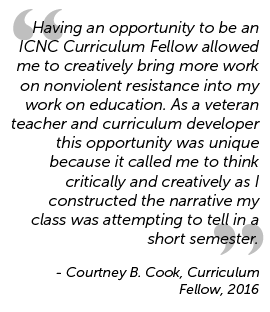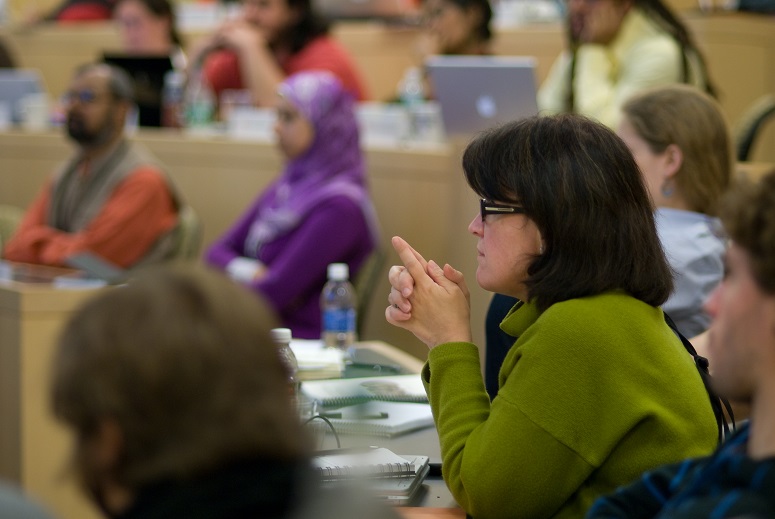Applicants interested in developing and teaching classroom-based courses
ICNC is interested in promoting teaching of civil resistance in academic institutions that have not yet developed coursework on the subject. We especially encourage applications from candidates who do not currently teach civil resistance at the institutions where they want to develop the new curriculum unit. We also prefer that the institutions have at present no courses on civil resistance offered as part of the departmental, school, or university curriculum.
Interested also in teaching online seminars? Check the curriculum fellowship for online courses.
Applicants are expected to develop a curriculum unit on civil resistance that, at minimum, covers five 90-minute sessions over the course of minimum of 5 weeks as part of the undergraduate or graduate course and consists of either instructor guides, readings, modules, exercises, or simulations directly relevant to the field of civil resistance.
The curriculum fellowship is designed to plant a seed for continued education on civil resistance. Applicants should therefore be able to demonstrate that their curriculum is part of a long-term, sustainable teaching plan, as opposed to being a one-off course offering.
Application deadline: April 30, 2017.
Click the links to learn more:
- Eligibility

- Award
- Fellowship Components
- How to Apply
- Recommended Resources
- Fellowship Distribution
- Past Curriculum Fellows
Eligibility
- Scholars, and instructors from colleges and universities around the world who are interested in expanding their institutions’ existing curriculum to cover civil resistance.
- Educators and trainers who might be loosely affiliated with academic institutions at home or abroad but have academic-based training or pedagogical and teaching experience, particularly in regions and countries with restrictive civic spaces or conflicts.
Award Details
In 2017, up to seven curriculum fellowships, each in the amount of $1,300, will be offered on open, merit and competitive bases to qualified applicants to develop:
- a curriculum unit on civil resistance that will be offered as a self-standing, elective or mandatory, course at the applicant’s home university
or
- a curriculum unit on civil resistance that will be incorporated into the existing, elective or mandatory, course at the applicant’s home university
In addition to a curriculum fellowship grant, awardees will receive a package with academic books and documentaries on civil resistance. ICNC provides these resources free of charge as part of its curriculum fellowship package to help its fellows develop the content on and teach civil resistance.
Teaching for 2017/2018 ICNC Curriculum Fellowships is expected to take place either in Summer, Fall 2017 or Winter, Spring 2018.
As part of the fellowship it is expected that:
a. fellow develops a full-fledged course syllabus that includes a curriculum unit on civil resistance. A unit on civil resistance covers minimum five 90-minute sessions over the period of minimum of 5 weeks.
b. sessions on civil resistance that are part of the developed curriculum unit will, at minimum, analyze and explain to students:
- what civil resistance is, prevailing misconceptions
- historical record and effectiveness of civil resistance
- strategies and tactics of civil resistance
- dynamics of civil resistance including but not limited to the phenomenon of backfire, defections, movement mobilization, sustainability or tactical innovation and sequencing
c. no less than 10 students will register and attend the course
d. course syllabus, assignments and assessment materials are to be developed in English, though the course itself can be conducted in a different language
e. fellow hosts at least one guest speaker that will present on a selected topic on civil resistance
f. fellow develops online evaluation instrument to be used to assess progress in students’ learning about civil resistance
- template of a pre-seminar learning gains survey (distributed prior to the start of the seminar)
- template of a post-seminar learning gains survey (distributed at the end of the seminar)
g. fellow develops online final course evaluation to solicit students’ feedback on the course content on civil resistance
Review:
- template of the final course evaluation
h. fellow submits a final report to ICNC soon after the course or curriculum unit ends. The report will summarize content on civil resistance delivered, including any innovative teaching tools used, information on the guest speaker talk, aggregate results from the students’ learning gains surveys, results from the final evaluation and general lessons learnt
i. students’ feedback/evaluation and recommendation for improvements
j. fellow selects and submits to ICNC- with students permission –one/two outstanding pieces of written or audio/video work on civil resistance done as part of the course
To be considered applicants should review ICNC recommended list of resources, fill out the online application form, submit CV and curriculum proposal, and other information as requested.
How to Apply
To be considered applicants should fill out the online application form, submit their CV and curriculum proposal, and other information as requested.
APPLY for the Classroom-Based Fellowship
The curriculum proposal should include a detailed description of the content of at least five 90-minute sessions that will be taught for a minimum of 5 weeks. Each proposed session must include a brief description of the topic covered, as well as a list of assigned readings on civil resistance. If applicable, the applicant should also attach a revised syllabus that will include the newly proposed sessions on civil resistance and explain how these new topics relate to the existing course material. Finally, the application will identify the course number, its elective or mandatory status, departmental/institutional affiliation for the course, average number of enrolled students, and the semester when it will be offered.
Application deadline: April 30, 2017 for courses that will be offered in Summer, Fall 2017 or Winter, Spring 2018
Recommended List of Resources for Curriculum Proposal Development
In developing the curriculum proposal on civil resistance for a classroom-based course, applicants are strongly encouraged to review the ICNC universal e-classroom for ideas on curriculum content as well as sample syllabi. In addition, applicants may wish to consider integrating into the sessions on civil resistance the following resources:
- ICNC translations: if a proposed course is taught in a language different than English, a fellow will be expected to incorporate translations of civil resistance literature available in the ICNC library, which houses materials on civil resistance in 55 languages
- A Force More Powerful, 2000 documentary
- Bringing Down a Dictator, 2001 documentary
- Orange Revolution, 2007 documentary
- Erica Chenoweth and Maria Stephan, Why Civil Resistance Works. The Strategic Logic of Nonviolent Conflict (New York: Columbia University Press, 2011)
- Maciej Bartkowski, ed. Recovering Nonviolent History. Civil Resistance in Liberation Struggles (Boulder, CO: Lynne Rienner Publishers, 2013)
- Peter Ackerman, and Jack DuVall, A Force More Powerful: A Century of Nonviolent Conflict (New York: Macmillan, 2000)
- Shaazka Beyerle, Curtailing Corruption. People Power for Accountability and Justice (Boulder, CO: Lynne Rienner Publishers, 2014)
- Veronique Dudouet, ed. Civil Resistance and Conflict Transformation. Transition from Armed to Nonviolent Struggle (London: Routledge, 2015)
- A Diplomat’s Handbook for Democracy Development Support
Check also Selected Bibliography on Civil Resistance (2016)
Applicants’ curriculum proposal – to be submitted as part of the application process – is expected to include a list of resources on civil resistance that an applicant plans to incorporate into a classroom-based and identify a potential guest speaker suitable for a proposed civil resistance topic.
Fellowship Distribution
The fellowship grants will be disbursed in two equal installments. The first installment will be made after the course begins, the student enrollment is confirmed and the syllabus with a civil resistance component has been satisfactorily reviewed by ICNC. The second installment will be made after the classroom-based course ends and ICNC receives fellow’s final report and results of students’ evaluations pertaining to their learning on civil resistance and course assessment.
Past Curriculum Fellows
2016 Curriculum Fellows
2015 Curriculum Fellows
2014 Curriculum Fellows
